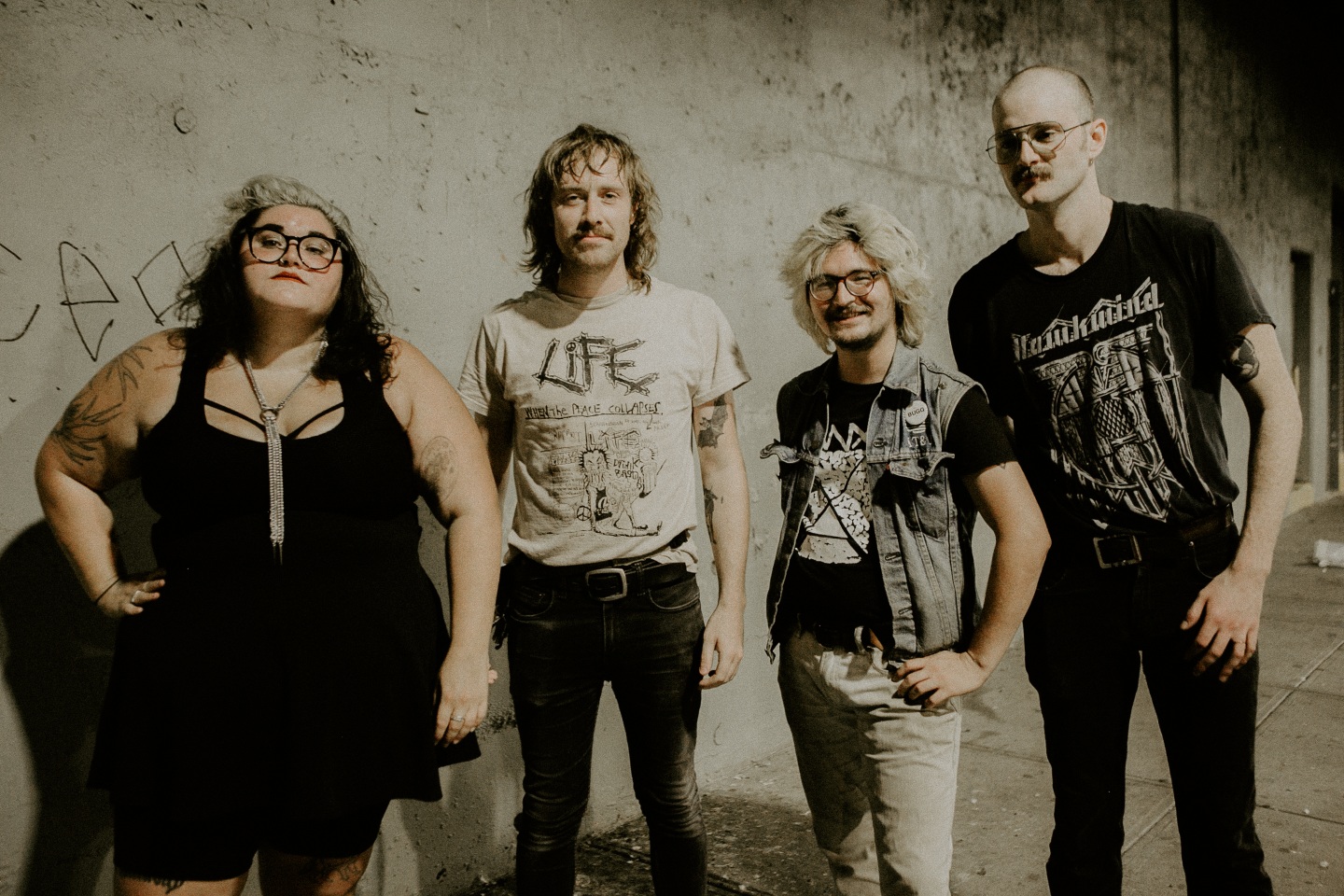Sheer Mag will never stop going in
The Philly punk band had another amazing year in 2019, with an energizing and personal-political new album.

A couple of true things. First: rock and roll is, in 2019, in a pretty weird place — being a cultural force that few people genuinely give a shit about. “Rock is dead,” they say! “Ask anyone!” Counterpoint: play an Oasis song in a bar, and see what happens. But, still, pretty weird. The second truth is that Philadelphia band Sheer Mag’s relationship to rock and roll itself is also pretty weird. There’s a way this game is historically played: strike a vaguely rebellious pose, play those three chords like a politician playing their base, and let a label do the work for you. Sheer Mag doesn’t seem terribly interested in playing it.
Since their first self-released 7” in 2014, Sheer Mag have jumped from one unfashionable micro-genre of rock music to another. From the in-the-red Thin Lizzy worship and basement-show Kool & The Gang-isms of the early EPs to the punky, power-pop kryptonite stabs of 2017’s debut LP Need To Feel Your Love, the band — Tina Halladay on vocals, Matt Palmer and Kyle Seely on guitar, and Kyle’s older brother Hart on bass — have played type of misfit rock that, in a musical landscape that prefers its rock as either sub-Springsteen beer ballads or arch sub-Darkness showboating, never should’ve left the basement.
Instead, kids and middle-aged kids alike all went fucking nuts. People online and off couldn’t get enough of this oddball collective of denim and leather, looking and sounding like the ragamuffin survivors of a Judas Priest-and-Big Star-founded orphanage that got burned down in an ‘80s teensploitation flick. Human beings and critics alike loved the guitars, the rough production, the first-date-at-the-DSA lyrics, and Halladay's swooning wail of despair and defiance. To the surprise of themselves, Sheer Mag were on their way to being huge.

With the release earlier this year of their second official album A Distant Call, Sheer Mag have — forgive the cliché — leveled up. Still recorded by Hart and engineered by Kyle, the band utilizes their previous experience, some new gear and effects, and the mixing of “Philly legend” Arthur Rizk (Eternal Champion, Power Trip) to make what’s easily their best album.
A “concept album” about Tina Halladay's traumatic relationship with both her late prick of a father and the prickish reality of 21st century capitalism, A Distant Call’s ten songs finesse between Kix-ian hard-pop, Turbo-era Priest, and the country moves on Fleetwood Mac’s Mirage without ever feeling haphazard or succumbing to the bloat of most (maybe all) concept albums, telling Tina’s story with streamlined, angry aplomb. The band’s backgrounds span from middle-class to dirt-poor; Halladay’s mother worked multiple jobs, from waitress to lifeguard (”To pay for all the kids she had with the piece of shit who didn’t pay for anything”), and her father is the topic of a number of songs on A Distant Call.
With DIY roots and a widescreen future, it’s fitting that the initial interviews conducted for this article were conducted at a hardcore festival that Sheer Mag weren’t playing. The Seely brothers’ band Grave Turner were playing one of the more metal-focused late nights of international punk festival Hardcore Hell (touring guitarist Kora Puckett’s band Bugg also played). Despite a grueling schedule of d-beat and discordant riff chaos that began in the afternoon and ran until the early morning, Sheer Mag looked like family to every sweaty punk who came up to them for hugs on the street. More than anything, the band seemed to be in town purely to revel in the underground that spawned them.

Despite Sheer Mag’s complete absence of hardcore sonic touchstones, the band comes from the community — even if its members got there a bit sideways. The men of Sheer Mag spent their teen years listening to either Tool or Deerhunter. “I decided to get new friends in ninth grade because all my friends were kind of dicks, so I started hanging out with weirdos and going to shows 40 minutes away,” Halladay remembers about discovering punk in a rural Long Island that was more “farms and wineries and fields and shit” than all-ages spaces.
The members of Sheer Mag all met in passing while attending SUNY Purchase; with its origins as the Seelys’ bedroom recording project, they didn’t take form as a proper band until everyone was done with school and lived in Philly at a place “lovingly” called “The Nuthouse,” which is where Sheer Mag played their first show. “We played the first 7”, and a cover of ‘Saturday’ by the Bay City Rollers,” Halladay recalls. “I knew we were doin’ something right when someone stopped me on the stairs and said we sounded like Thin Lizzy.”
The band’s ethics and aesthetics were immediately embraced by Philadelphia’s DIY community, and the press-slash-music industry was not far behind; soon, the band found themselves going from sponsored shows at Chaos In Tejas to playing Coachella the same day as LCD Soundsystem in 2016. Through it all, the band declined all label offers, instead releasing their music through their WIlsun RC label.
Sheer Mag has steadfastly maintained their autonomy; rather than argue about writing credit, they split the royalties evenly. “We’re all on the same page that this is the only way the band can be a long-term thing,” Hart explains; he calls A Distant Call, the “end of an era” because they’ll be employing their tour manager to assist with shipping out of warehouse in Portland. The band recently hired a business manager, too; after all, they’re still fuckup musicians, so it’s equally reasonable to not go overboard with the DIY sentiment.

After the touring and peripheral life that followed Need To Feel Your Love, Sheer Mag felt self-imposed pressure to make a new album fast; after touring with the likes of Red Death and Power Trip, their inclination was to make the music soundfast, too. Kyle claims that the goal was to focus on ass-kicking, minus the cretinous aspects usually associated with “hard rock”: “We can play all these genres, have fun with it and scrap what’s annoying about some of that shit. I love hair metal as a genre. I think you can like hair metal and hate being a piece of shit.”
Sitting at the crowded bar during Hardcore Hell, Halladay and Palmer walk me through the lyric-writing process; after noting that the bartender was playing Sheer Mag on the bar’s system, Halladay adjusts the mood by stating, “I wrote down every traumatizing thing my father did to me and gave it to Matt to read.” This is only a slight divergence from Palmer’s usual method of lyric writing, where he interviews Halladay for hours on end, combining his own empathetic imagination with some verbatim quotes to crystalize her and the band’s intent. He calls the album “a version of Christina that's not 100% her life, slightly fictionalized,” covering her father’s addiction and abuse as well as her carrying of that weight through a life worn down by our country’s politics.
With songs like “Cold Sword” (“When I was a girl/ I did my best to hide/ We all had to run for cover/ from my father and his drunken pride/ He’d leave us alone/ but never for too long”), Halladay lays bare the underlying harm at the root of A Distant Call. “[Writing and recording that song] was super painful, but it felt good to finally have a song about that,” she states. Balancing the personal is Palmer and Halladay political acumen; on “The Killer,” Sheer Mag indict the state’s murderous tendencies with a sound that not only resembles “classic rock” but actually sounds like a classic.
Every song on A Distant Call is colored with the ever-present news, and couching the personal amongst background noise of refugees lost at sea and teachers striking in West Virginia risks crossing the fine line between acting as an informed observer and taking up the role of trauma dilettante. Palmer states that the intent is “showing, not telling the political ideas” rather than having “a song for every thing that’s fucked up.” Throughout, Halladay lived experience and potent delivery keeps the record honest.
And Sheer Mag are still largely operating without a net — self-employed and getting by on the band for now. “People think I’m making tons of money because they don’t know the difference between getting recognized and getting paid,” Halladay explains. “I don’t get money for being in Rolling Stone. You don’t get fucking paid for getting press. I have enough money to survive…because I’m good at surviving.”
